Turkish Chess Federation vs. Dr. Daaim Shabazz (2012)
Chess community,
I am Dr. Daaim Shabazz, Associate Professor of Global Business at Florida A&M University and the creator/owner of The Chess Drum website. I am in good standing with the United States Chess Federation where I am an active player, Board Member of Florida Chess Association and have selflessly served the chess journalist community for the past 14 years (including five Olympiad events).
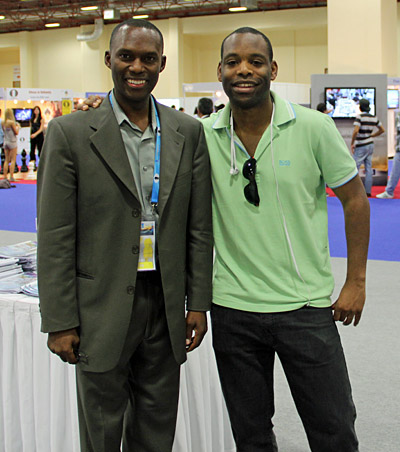
Dr. Daaim Shabazz & GM Pontus Carlsson at 2012 Chess Olympiad in Istanbul, Turkey. Photo by Daaim Shabazz (The Chess Drum)
Prior to that I served as a writer for several organizations including a brief stint at Sports Illustrated. Although my first career was in computer science, I have been writing in some capacity since serving on the sports staff of my undergraduate institution, Chicago State University. It is a community in which I enjoy the camaraderie of other journalists and have hopefully garnered the respect of my colleagues.
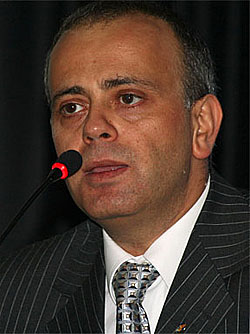
Ali Nihat Yazici, President of the Turkish Chess Federation (2000-2012).
Photo courtesy of ChessBase.
Until my discovery of the complaint, I was never notified by the TCF, EC or FIDE’s Commission of Chess Journalists (CCJ) that such a case had been filed. After recently requesting and receiving copies of the official complaints from the EC, I have confirmed that the complaint was pertaining to an article I wrote on The Chess Drum dated September 19th, 2012.
Had this complaint gone through, it would have resulted in hearing that I would have been ill-prepared for. Seeing the case cited on Mark Weeks’ blog was a revelation, but he was also unsure of the purpose of the complaint. Dated December 12th, 2013, Weeks wrote on his blog…
The Turkish federation often appears in ethics cases. Here’s one they initiated, although I’m not sure what the original complaint was. I imagine that it has something to with journalistic standards:-
Case n. 15/2012: “Turkish Chess Federation against Mr. Daaim Shabazz” (complaint by the Turkish Chess Federation against Mr. Daaim Shabazz), the EC rules that: – the case has to be rejected as not receivable and has to be dismissed.
The FIDE Commission of Chess Journalists
However, this complaint is a matter of record (see Report to FIDE Executive Board) and leaves readers wondering why the TCF filed a complaint. The case was rejected, but there is a lingering question, “What did Daaim Shabazz do to deserve such complaint launched by a national chess federation and why is he responding so late?” Let’s go into why am I bringing this up three years afterwards.
- Firstly, I just discovered the case relatively recently;
- secondly, it should be noted that I responded to the accusation;
- thirdly, a response creates a public record to match the public record of FIDE.

Georgios Makropolous speaks on the creation of a commission for journalists and its goals. Advance to 22:55 into the clip. Video by North American Chess Association.
One of the tasks of the CCJ is “to help protect chess journalists from plagiarism and copyright infringement etc.” as highlighted in the CCJ minutes in Tallinn, Estonia (2013). There are also principles of honoring intellectual property cited in CCJ minutes in Tromso, Norway (2014).
When the CCJ was created, it appeared to be a reaction to some critical articles by journalists of FIDE-related events. The protection of FIDE trademarks, symbols and its brand are understood but if the CCJ is in the business of deciding who can cover events based on their story angle, then how does one preserve journalist’s right to express his or her views objectively? In fact the CCJ’s October 2013 minutes list “controlling” as one such directive. It reads,
6) Controlling. Control and prevention of violations in Media, helping in protection of FIDE copyrights, chess journalists copyrights during and after FIDE and other chess events (by reporting and correcting mistakes, sending letters). Chess commission can have a permission to publish the information about those who break the copyright law and don’t respect the standards of journalistic ethics and principles. Commission has the right to withdraw ID card in special cases (if chess journalist doesn’t follow principals of journalism etc.).
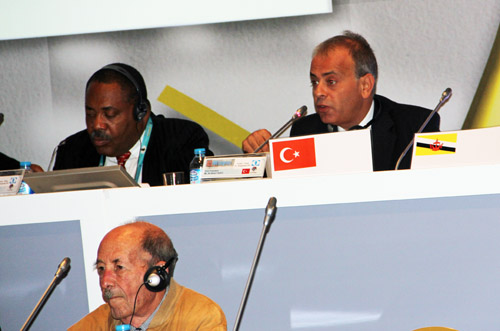
Ali Nihat Yazici speaking on journalist ethics at 2012 Chess Olympiad.
Photo by Daaim Shabazz.
Thus, a FIDE commission reserves the power to issue rights and authority to cover its events and also to sanction and withdraw membership from those who “don’t respect the standards of journalistic ethics and principles” in accordance with the International Federation of Journalists (IFJ). While it is good to have organizations with standards of quality, chess journalists should maintain a level of independence that does not influence how they will write and cover events.
The Complaint against Dr. Daaim Shabazz
Let me preface my comments to say that my voicing the concern which led to the complaint had nothing to do with the 2012 Chess Olympiad hosted by the Turkish Chess Federation (TCF). Neither was there a conspiracy with any functioning body, nor a political organization to undermine this spirited event. I traveled to Istanbul at my own expense representing no political chess group or operating in an official delegate capacity (for the USA). The question would be why did the TCF file the complaint against me?
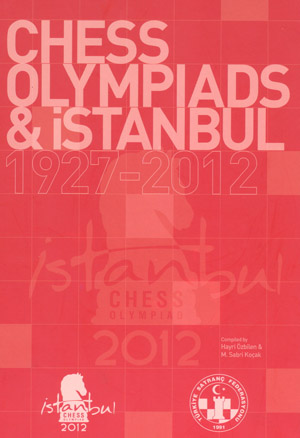
After the 2012 Chess Olympiad in Istanbul, Turkey I wrote a story about the publishing of “Chess Olympiads & Istanbul” book published which sold for 28 euros at a vending booth at the Olympiad (pictured right). While I praised the idea of the book, I also cited what appeared to be an egregious act of plagiarism by those who compiled it. Admittedly, I had no contact with those who compiled the book, nor did I have contact with the TCF prior to writing the September 19th post.
After the story broke, several journalists were informed of the story and Peter Doggers of Chessvibes.com approached Mr. Yazici at a tournament in London. Mr. Yazici asserted that the copying of content from olimpbase.org was covered by a statement on its site, “© Free to copy. Please cite the source.” He appears to be invoking the “fair use” clause giving users the right to replicate copyrighted material for very specific uses.
If we are to be honest about journalistic standards and the goals of journalist organizations, we have to understand that the “free to copy” statement comes with restrictions. There are generally a few factors determining when use is “fair”. Such factors are the nature of use, the size or the portion used, whether the use is for commercial purposes and the effect on the market value of the original work.
The reason for the complaint against my writings on The Chess Drum should be noted. Mr. Yazici’s TCF filed the complaint to the EC citing an ethical infraction. Furthermore, he noted that the TCF and authors Dr. Sabri Kocak, Mr. Hayri Ozbilen were “insulted, humiliated and being accused by (sic) stealing the content of olimpbase.org”.
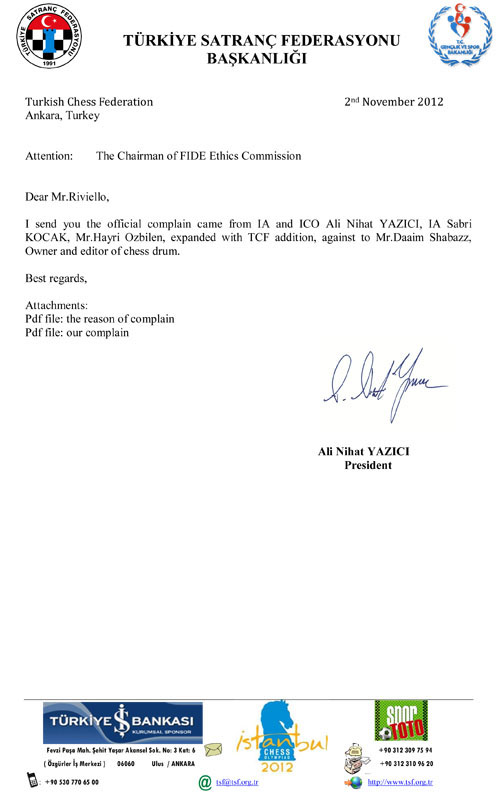
The Turkish Chess Federation sent to the FIDE Ethics Commission (1) cover letter, (2) official complaint and (3) evidence.
The complaint was labeled as Case n. 15/2012 “Turkish Chess Federation against Mr. Daaim Shabazz”. The ruling by the EC was “the case has to be rejected as not receivable and has to be dismissed”. In other words, the EC found that the case was not substantive enough to bring to a hearing and would not go further. Despite the case being dismissed, I will address some of the points contained in the official complaint.
I. Explanations and Complains from compilers point of view: (Hayri Ozbilen and Sabri Kocak)
- My reference to 1924-2012 was cited as “carelessness and negligence”. The first official Olympiad was indeed in 1927 (London). Since I was referring to the book, the 1924-2012 reference could certainly be considered an error (on my part) as the book omitted the two tournaments held prior to the first official Olympiad… 1924 (France) and 1926 (Hungary). While these were not official Olympiads, they served as forerunners of the Olympiad and are part of its history. Mr. Yazici even acknowledges these events in his introduction as “Olympiads”. This point by the authors was very weak.
- The complaint states that the two responsible for publishing the book eschew being labeled as “authors” since they admit that they did not write the content. The book does say “compiled”. If that is an admission of using other sources, then I agree… and admittedly, a very liberal use of cut-and-paste from the primary source of the tournament reports, olimpbase.org.
- “The texts are partially taken from Olimpbase…” Firstly, the word “partially” is disingenuous. I checked every Olympiad entry and with the exception of 2012 entry (since 2012 Olympiad was still in progress) most other tournament data were taken from olimpbase.org. Admittedly, there were selective omissions of paragraphs and the content was “abbreviated”. Secondly, “free to copy” does NOT mean the author of the content forfeits all rights to his property. This is especially true if another party is using the material to make a profit. Even if one argues under the provision of “fair use”, this legal permission comes with certain restrictions.
- The notion that the book is 33% new may technically be true, but is also disingenuous. I had already mentioned that the 2012 Olympiad segment represented original content (photos on pages 193-287) because the tournament was still in progress when the book was being sold. What about pages 1-193?? My allegation of plagiarism was for the tournament entries which makes up the bulk of the book. Saying that the tournament entries were abbreviated is irrelevant. One cannot say that out of 10 paragraphs from olimpbase.org only five were copied so only 50% was used. That is totally wrong since little else was added to the tournament entries from pages 1-193.
- The complaints stated, “Because of Olimpbase texts are taken approximately 70% abbreviated, someone would like to read the full story needs the source Olimpbase.”Well… this is quite a statement of admission.
II. Explanations and Complaints from Ali Nihat YAZICI
On the explanations by Mr. Yazici… no one said he was on the editorial staff. However, while serving as a sitting Vice President of FIDE, while initiating the aforementioned book project and while standing as a leader of the Turkish chess community, he endorsed a project with serious ethical issues. It is uncertain if he was aware of olimpbase.org, but citing “free to copy” is a weak argument in the field of intellectual property. Given Bartelski’s reaction to the book, one can understand that he was not ceding control of his work.
III. Complaint on behalf of Turkish Chess Federation
It goes without saying that the book was put together in a tight schedule and that tremendous effort was expended by the Dr. Kocak, Mr. Ozbilen and staff. However, it is also quite unfortunate that Mr. Yazici (in the name of TCF) tries to blame the poor internet sales of the book on my blog entry. I stand by my claim. As an academic scholar, this is something that would be rudely condemned and sanctioned.
Mr. Yazici accused me (Dr. Daaim Shabazz of The Chess Drum) with violations of FIDE Ethical Codes 2.2.4 and 2.2.9 and 2.2.10 and 2.2.11. It is strange that 2.2.9 is mentioned since I was not a player, team captain, arbiter or member of a delegation. Again… I was serving as an independent journalist paying from personal funds. It is not clear how 2.2.10 and 2.2.11 apply either. Perhaps 2.2.4 would assert that I did not follow “normally accepted standards of courtesy,” but there is nothing far-fetched about my claim.
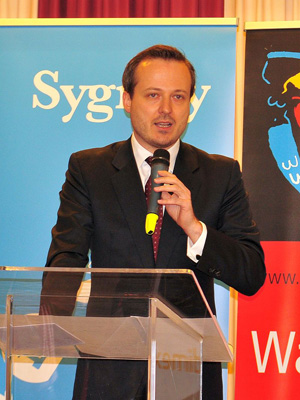
Poland’s Wojciech Bartelski of Olimpbase.
Photo from Bartelski’s Wikipedia.
“Fair Use” provisions are very specific on the rules for using intellectual property. In fact, Wojciech Bartelski was not notified (as a courtesy) that such a book was being made almost completely from his site. I have shared materials with Mr. Bartelski on many occasions and know his work well. Thus, I notified him of this book after I examined it. Once he received his copy, he was understandably perturbed but did not file a complaint. Unfortunately, this Olympiad project precludes him from ever doing such a book from his own materials as a unique project. In addition, the aforementioned book will have a significant impact on the commercial market for any subsequent work gleaned from olimpbase.org. To date, Bartelski has not filed a complaint with the EC, nor has he sought litigious action.
Apparently, after learning of the article I wrote, Mr. Yazici (under the name of the TCF) filed the complaint to the EC. According to the minutes, he was an observer in the meeting where the EC read, “Case n. 15/2012: Turkish Chess Federation against Mr. Daaim Shabazz“. I was not informed and thus not present in Tallinn, Estonia, physically nor virtually. The complaint is mentioned on several sites including a German-language site that referred to an article at chess-news.ru.
“- Der Fall “Türkischer Schachbund gegen Mr. Daaim Shabazz” wurde abgewiesen. Das hab ich mal gegoogelt, da ich Shabazz nur als Webmaster von chessdrum kenne. Ich schätze mal es geht darum : Another “Relatively Fair Way of Obtaining Money” | chess-news.ru
What standards are we following?
Certainly, bringing out violations of journalist ethics is exactly what we want. It is what is in accordance with the CCJ’s goals and objectives. Chess journalists make up a small, yet cooperative group. We share information and have a mutual understanding about the use of materials. In this case, no journalist would believe that the Olympiad book was in accordance with the highest standards of journalism. Yet the TCF filed a complaint against a journalist (Shabazz) who cites the violation? Mr. Yazici recommended sanctioning by the CCJ, but it would not be wise for him to take such a case to any body of journalists. Is it possible that Mr. Yazici could not convince members of the CCJ to file such an action?
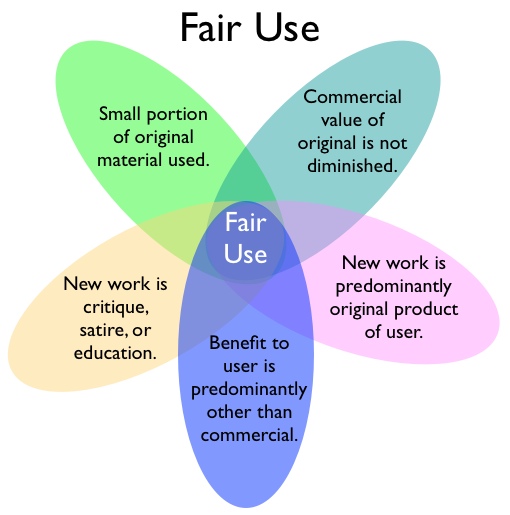
Without any pretension, it may have been fortunate that the case was dismissed and did not go to a hearing and trial. It would have meant Mr. Yazici and other parties would have had to divulge intricate details of the project in front of the EC. Any statement claiming rights from the “free to copy” label would easily be refuted by any credible judicial board with access to international codes on intellectual property. To admit to copying content and then invoking “fair use” clause to make a profit on said work is egregious.
This is not a personal vendetta or hyperbole aimed at the TCF or Mr. Yazici himself. Journalists have to protect their rights against censorship and against practices of others profiting off of rightful owners of intellectual property. It is up to journalists to stand when a colleague’s rights are endangered or violated. If the CCJ is a body to ensure that an ethical threshold is kept within journalistic circles, they have to be diligent and ensure that no one is exempt… not even a person of great influence.
~ Dr. Daaim Shabazz, The Chess Drum
Index of Sources
- Sevan Muradian, “83rd FIDE Congress Meeting (video index),” Istanbul, Turkey, 1st-10th September 2012. Index of all sessions at FIDE Congress.
- Sevan Muradian, “83rd FIDE Congress Meeting (Executive Board),” Istanbul, Turkey, 1 September 2012. Video of Makropolous discussing chess journalists beginning at 22h:55m.
- Daaim Shabazz, “Olympiad book copied from Olimpbase.org?” The Chess Drum, 19 September 2012. Initial article that provoked complaint from TCF.
- Turkish Chess Federation, “Cover letter to FIDE Ethics Commission,” 2 November 2012. Letter presenting official complaint against Shabazz to FIDE Ethics Commission.
- Turkish Chess Federation, “Official Complaint of Turkish Chess Federation,” 2 November 2012. Detailed complaint against Shabazz presented to FIDE Ethics Commission.
- Turkish Chess Federation, “Evidence against Daaim Shabazz,” 2 November 2012. A screenshot of Shabazz article from The Chess Drum.
- Mark Weeks, “FIDE Journalists’ Commission,” Chess for All Ages (website), 2 December 2012. Discussion of newly-formed Commission of Chess Journalists (CCJ).
- FIDE (Commission of Chess Journalists), “Minutes-Commission of Chess Journalists,” 2013 FIDE Congress, Tallinn, Estonia, 5 October 2013. A listing of directions, goals, tasks and a member list.
- Mark Weeks, “Ethics and Cheating,” Chess for All Ages (website), 12 December 2013. Reference to case against Shabazz.
- salto.mattale, “FIDE Ethics Commissions,” Schachfeld.de, 10 Feburary 2014.
- FIDE (Commission of Chess Journalists), “Minutes-Commission of Chess Journalists,” 2014 FIDE Congress, Tromso, Norway, 6 August 2014. Minutes of CCJ and a presentation of the “Principles of Chess Journalism”.

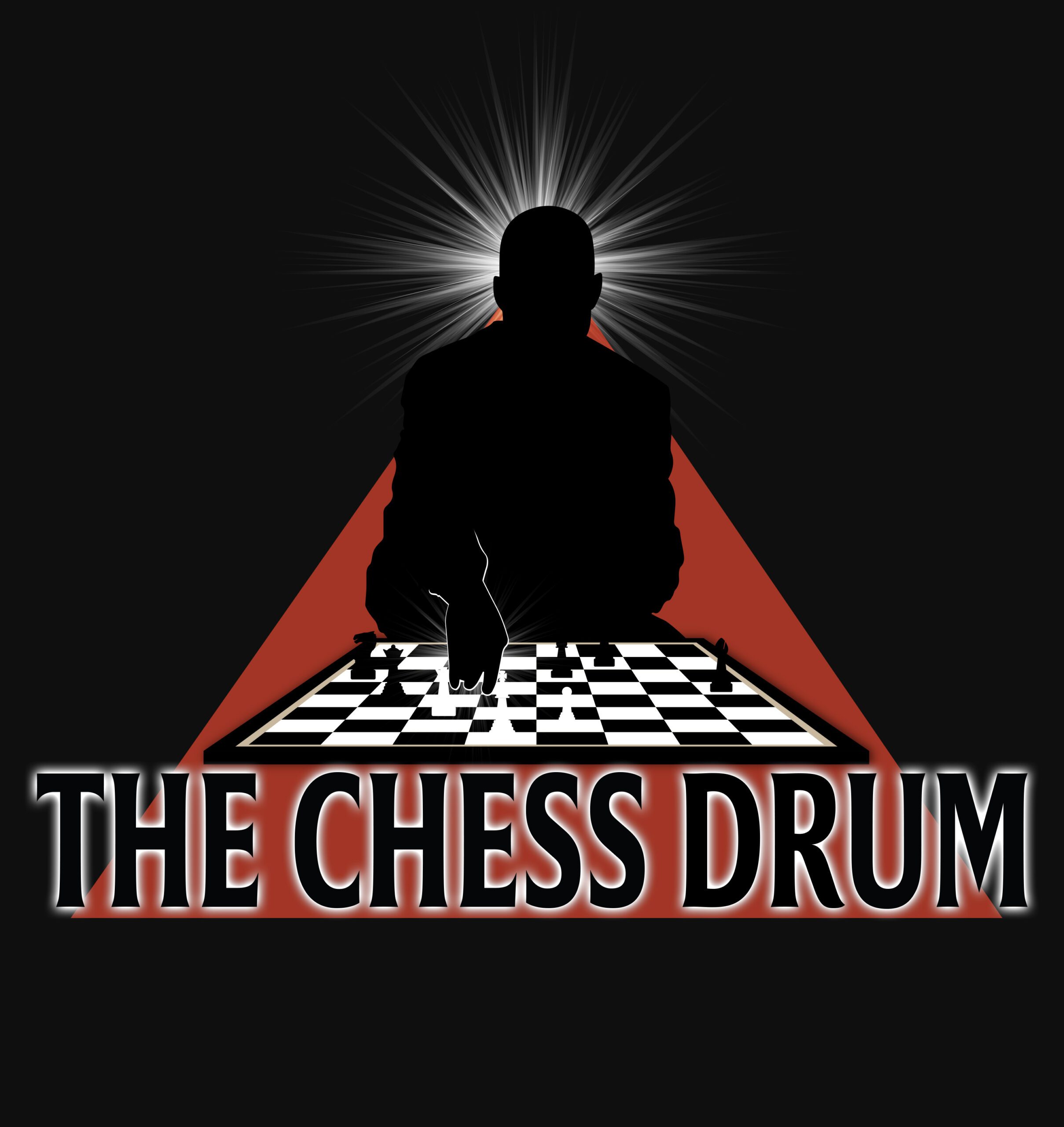
This is nothing more than retribution for your criticism of the book.
I assume that thru this suit (intimidation), that you may he been forced to retract your statements. Strange that you were never notified.
The Ethics Commission dismissed the case so it didn’t get far at all. Bear in mind, that there are people who know me and understand that I do not play games in unjustly accusing people for sport. However, I had to respond to make it a public record.
There’s an old saying that there are three sides to every story. What is said, what you said and what was said. Clearly EC had no problem aligning what you said with what was said. Real or perceived, I don’t see the ethical lapse in your explanation. Anyway, all’s well that ends well and keep the drum beating!
I suppose my statement would have been more effective had I learned of the case three years ago. When I attended the Tromso Olympiad last year, I was never approached by anyone on this matter. It was if it never happened, but there is a public record of it which Mark Weeks referenced. Thus, I felt a need to have a public record somewhere in case it comes up again.
World Trade Organization – TRIPS Treaty (1995 Uruguay Round)
https://www.wto.org/english/docs_e/legal_e/27-trips.doc (MS-Word)
https://www.wto.org/english/docs_e/legal_e/27-trips.pdf (PDF)
https://www.wto.org/english/docs_e/legal_e/27-trips_03_e.htm (Part 1 of 7)
There is no shame here. The complaint or lawsuit confirms that your reportage is not being taken casually. I’d be more honored then irritated in this situation.
Well… I don’t like the fact that I cannot go to chess events in Turkey now. Ali used the TCF to bolster his case when the federation had nothing to do with it. Now it is a permanent record.
Thanks Daaim for making this disappointing episode public.
This is very disturbing conduct by the TCF. What can ordinary players do to put pressure on the TCF to rectify this egregious misconduct?
Jones,
I believe the TCF was dragged along partly because their logo was on the book (thus bearing some responsibility), but primarily because of Mr. Yazici’s initiative and his position of being the President (at that time). He is no longer President and I am not sure of his status with the federation. I have heard rumblings about a rift within the TCF, but I have not verified this.
It is shameful that the plagiarism took place, but then you can rectify the mistake. However, to first not admit the mistake and then attack the person who brings the mistake out is quite puzzling. Yazici is really fighting with fire on this one and opened the TCF up for sanctioning.
Thanks for having brought up this issue. I’m quite disgusted by that claim and I wonder if it was legally possible for the EC to turn the table and open a file against whoever had a resposibility role in the publishing of that book.
This reminds me what happened to me almost 5 years ago (https://scacchi.chess.com/news/chess-journalist-in-tournament-ban-4546), even if in that case it was a private organizer involved. I did write to FIDE back then, but of course nothing happened.
As I wrote in my statement, which applies to your case as well, “[This] is not much about me as an individual, as it is about a breach of principles that belong to the cultural heritage, legal system and shared values of a democratic society.”
Of course, I remember the case well. I’m glad you cited it. I could have cited other cases including Evgeny Surov’s case, but perhaps there will be enough momentum to put an end to the abrogation of rights of chess journalists. To create a body in order to further control the expressions of journalists is misguided. This does not mean that there are not people serving on that commission who are not well-meaning. However, I believe it may serve as a control mechanism to punish those who may independent views. We also have to realize that not everyone comes from a country where journalists have such rights.